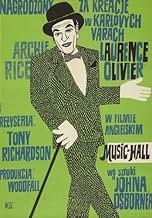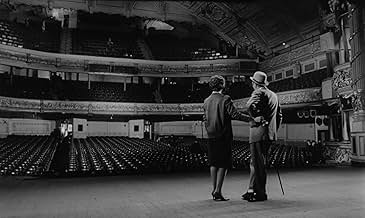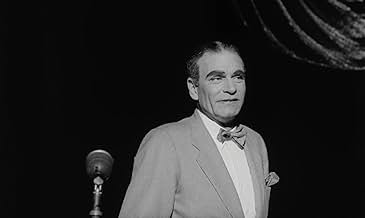Archie Rice, an old-time British music hall performer sinking into final defeat, schemes to stay in show business.Archie Rice, an old-time British music hall performer sinking into final defeat, schemes to stay in show business.Archie Rice, an old-time British music hall performer sinking into final defeat, schemes to stay in show business.
- Director
- Writers
- Stars
- Nominated for 1 Oscar
- 1 win & 5 nominations total
Laurence Olivier
- Archie Rice
- (as Lawrence Olivier)
Brenda de Banzie
- Phoebe Rice
- (as Brenda De Banzie)
Shirley Anne Field
- Tina Lapford
- (as Shirley Ann Field)
MacDonald Hobley
- McDonald Hobley
- (as McDonald Hobley)
- Director
- Writers
- All cast & crew
- Production, box office & more at IMDbPro
7.14K
1
2
3
4
5
6
7
8
9
10
Featured reviews
Fascinating, a must-see.
"The Entertainer" is a fascinating film based on the play by John Osborne ("Look Back in Anger"); Osborne co-wrote the screenplay.
Olivier plays Archie Rice, a fading entertainer in a fading medium (music halls) in a fading empire (the Suez crisis of 1956 figures into the action).
Archie's speech to his daughter (Joan Plowright), onstage in an empty theater, about being dead behind his eyes, is especially memorable.
Along with other fine actors, Alan Bates and Albert Finney as his sons flesh out this film, which is a must-see for fans of any of these actors.
Olivier plays Archie Rice, a fading entertainer in a fading medium (music halls) in a fading empire (the Suez crisis of 1956 figures into the action).
Archie's speech to his daughter (Joan Plowright), onstage in an empty theater, about being dead behind his eyes, is especially memorable.
Along with other fine actors, Alan Bates and Albert Finney as his sons flesh out this film, which is a must-see for fans of any of these actors.
How could anyone be anything but enthralled by this?
As an American, getting a peek at post-War Britain in decline, a look at Olivier as a most interesting character in the person of never-was vaudevillian Archie Rice, and a look at several British players (Joan Plowright, Anthony Bates, and Albert Finney) very early in their careers is priceless.
Archie Rice is a despicable character, and the drama centers on his problems of having all of his financial issues - including some long overdue tax debt - come to a head just as he can finally get no more work as a vaudevillian even in the bad music halls. He has a way out - one of his relatives will pay off his debts if he'll accept his drunken wife's nephew's offer to run a motel in Canada. But like any Briton who can remember England's finer days he's just not about to cut and run, and even though I can despise the lying, the cheating on his used up wife, his odd ideas about parenting, and his willingness to use his own father, I can't help but admire his "pioneer spirit" to use an American term. He'd rather fail on his own terms than succeed on someone else's.
Joan Plowright is the other lead, and she plays Archie's daughter, Jean. She shows some pioneer spirit herself. She shares some characteristics with dad - she's a painter who can't paint, Archie's a vaudevillian who can't entertain. Unlike dad, she owns up to her shortcomings and wants to make a contribution anyways by teaching art to poor slum kids. She has a way out of Britain just like dad does. Her fiancé has been offered a job opportunity in Africa, and he encourages her to leave her dead country behind, but she just isn't ready to give up on England or her family just yet. The two have a falling out and Jean goes to visit her dysfunctional family, in which she finds comfort.
I just don't get people who say that they don't like this one because it's boring, depressing, ugly. Every minute of this film held my interest and stayed with me long after I'd watched it. I think you need to have lived awhile, to have had disappointments, and to have dealt with those disappointments in ways you may not be proud of to really appreciate this film.
Archie Rice is a despicable character, and the drama centers on his problems of having all of his financial issues - including some long overdue tax debt - come to a head just as he can finally get no more work as a vaudevillian even in the bad music halls. He has a way out - one of his relatives will pay off his debts if he'll accept his drunken wife's nephew's offer to run a motel in Canada. But like any Briton who can remember England's finer days he's just not about to cut and run, and even though I can despise the lying, the cheating on his used up wife, his odd ideas about parenting, and his willingness to use his own father, I can't help but admire his "pioneer spirit" to use an American term. He'd rather fail on his own terms than succeed on someone else's.
Joan Plowright is the other lead, and she plays Archie's daughter, Jean. She shows some pioneer spirit herself. She shares some characteristics with dad - she's a painter who can't paint, Archie's a vaudevillian who can't entertain. Unlike dad, she owns up to her shortcomings and wants to make a contribution anyways by teaching art to poor slum kids. She has a way out of Britain just like dad does. Her fiancé has been offered a job opportunity in Africa, and he encourages her to leave her dead country behind, but she just isn't ready to give up on England or her family just yet. The two have a falling out and Jean goes to visit her dysfunctional family, in which she finds comfort.
I just don't get people who say that they don't like this one because it's boring, depressing, ugly. Every minute of this film held my interest and stayed with me long after I'd watched it. I think you need to have lived awhile, to have had disappointments, and to have dealt with those disappointments in ways you may not be proud of to really appreciate this film.
"What Do I Care"
That little song that Laurence Olivier sings through out The Entertainer as part of his musical hall act really does sum up his philosophy of life.
Outside of the classics this is Olivier's greatest role and some would not even put that qualifier on his performance. Olivier retained great affection for his role as Archie Rice. He said it contained more of the real him than any other role.
That's hard to believe because what Archie Rice is is a third rate song and dance man. His father played by Roger Livesey was a great performer back in the day. But Archie never has and never will make it to the top. Think Frank Sinatra and Frank Sinatra, Jr. and you get some idea.
He's more like Willy Loman in that he's facing his midlife crisis, knowing full well he's not really accomplished all that much. Still he plods on. Unlike Willy the luckless middle-aged salesman, Archie's full of tricks. His credit is all gone, and he's planning to woo and win a young beauty who's an airhead like her mom with the object of getting their backing for a new show. He's ready to throw over wife Brenda DaBanzie without a by your leave.
The only one who Olivier has any kind of human feelings for is his daughter played by Joan Plowright. It was in the original cast of The Entertainer that Olivier first met the woman who became the third and last Mrs. Olivier. When he was made a peer in fact Joan became Lady Olivier.
In fact from the Broadway production, Olivier, Plowright and DaBanzie were the only ones from that cast who were in the film. But some rising young talent like Alan Bates, Albert Finney, and Daniel Massey all got some good first notice in The Entertainer playing Olivier's two sons and Plowright's fiancé.
The Entertainer is a downer of a film. There ain't a middle aged man who doesn't know what Archie is going through. But our sympathies are never with him. Usually that would mean one big box office flop if the audience can't sympathize or empathize. But it's Olivier's skill as a player that makes us want to see what does become of Archie.
It's an ending, but in a very minor key. Well deserved I thought.
Outside of the classics this is Olivier's greatest role and some would not even put that qualifier on his performance. Olivier retained great affection for his role as Archie Rice. He said it contained more of the real him than any other role.
That's hard to believe because what Archie Rice is is a third rate song and dance man. His father played by Roger Livesey was a great performer back in the day. But Archie never has and never will make it to the top. Think Frank Sinatra and Frank Sinatra, Jr. and you get some idea.
He's more like Willy Loman in that he's facing his midlife crisis, knowing full well he's not really accomplished all that much. Still he plods on. Unlike Willy the luckless middle-aged salesman, Archie's full of tricks. His credit is all gone, and he's planning to woo and win a young beauty who's an airhead like her mom with the object of getting their backing for a new show. He's ready to throw over wife Brenda DaBanzie without a by your leave.
The only one who Olivier has any kind of human feelings for is his daughter played by Joan Plowright. It was in the original cast of The Entertainer that Olivier first met the woman who became the third and last Mrs. Olivier. When he was made a peer in fact Joan became Lady Olivier.
In fact from the Broadway production, Olivier, Plowright and DaBanzie were the only ones from that cast who were in the film. But some rising young talent like Alan Bates, Albert Finney, and Daniel Massey all got some good first notice in The Entertainer playing Olivier's two sons and Plowright's fiancé.
The Entertainer is a downer of a film. There ain't a middle aged man who doesn't know what Archie is going through. But our sympathies are never with him. Usually that would mean one big box office flop if the audience can't sympathize or empathize. But it's Olivier's skill as a player that makes us want to see what does become of Archie.
It's an ending, but in a very minor key. Well deserved I thought.
Very good character studies, though it's tough to care about any of them
This film is about a not especially talented vaudeville-style actor (played by Olivier) who sings a little and does some comedy--but not especially well. It's set in some British town by the sea (probably Brighton) and is set in 1956--when this sort of low-brow entertainment was on its way out and during the Suez Incident (the younger son is sent there soon after the film begins). This actor is pretty obnoxious and brings misery to his family since he's basically no good and selfish. The film switches from his viewpoint to his daughter's (played by Olivier's soon wife-to-be, Joan Plowright). She sees again and again that he's a jerk but despite everything, she is strangely loyal to this rogue. The rest of the family is pretty much living in Olivier's shadow and caters to his every obnoxious whim. The only exception is Olivier's father--an excellent character study of a man who tries to do the right thing by everyone.
Technically speaking, this is a very good film--the actors all did a fine job and the writing was pretty good as well. The problem for me was that I just didn't feel much of a connection, as it was hard to care about any of them. Now this isn't a complaint so much as saying that this type of character study may apply to some, it's not a film that will appeal to a wide audience. I guess my problem is that I have known people like the jerk Olivier played in the film and I felt irritated with him and his family for accepting his obnoxious behaviors. Sure, this is true to life--there are people like the one Olivier played who are users and ne'r do wells and there are many family members that put up with the lies and mistreatment. In some ways, I could see the film as being very therapeutic for some--it just wasn't something I particularly enjoyed or needed to see.
Technically speaking, this is a very good film--the actors all did a fine job and the writing was pretty good as well. The problem for me was that I just didn't feel much of a connection, as it was hard to care about any of them. Now this isn't a complaint so much as saying that this type of character study may apply to some, it's not a film that will appeal to a wide audience. I guess my problem is that I have known people like the jerk Olivier played in the film and I felt irritated with him and his family for accepting his obnoxious behaviors. Sure, this is true to life--there are people like the one Olivier played who are users and ne'r do wells and there are many family members that put up with the lies and mistreatment. In some ways, I could see the film as being very therapeutic for some--it just wasn't something I particularly enjoyed or needed to see.
The last, golden days of Morecambe...
As someone who lives only a couple of miles away from where this film was set, it makes me practically WEEP to see how busy and vibrant Morecambe used to be in the 50s/60s. OK, so the film is about how it's passed its heyday, but compared to how it is now - seeing the same scenery (it's hardly changed) - the Midland Hotel, The Winter Gardens (now a nightclub), it's hard not to get painful pangs of nostalgia.
This is ultimately a depressing film - Archie is one of those people who deals with tragedy by "blanking" it out with bad jokes. In the film he seduces the winner (2nd place) of a beauty contest - a woman old enough to be his daughter. Shortly after the film, Laurence Oliver married Joan Plowright who actually PLAYED his daughter in this film. Anyone for irony?
There are some wonderfully subtle takes on British "class" - I love Thora Hird (a long way from Praise Be and Stannah Stairlifts here) as the grasping mum of the Beauty-contest winner, while Brenda de Banzie is great as neurotic, looked-over, teary, nervy Phoebe - "I've got a new job in Woolworths, on the electrical counter. It's OK, but the girls are a bit common." Well Phoebe, you'll be pleased to know that the branch of Woolworths is still there...
This is ultimately a depressing film - Archie is one of those people who deals with tragedy by "blanking" it out with bad jokes. In the film he seduces the winner (2nd place) of a beauty contest - a woman old enough to be his daughter. Shortly after the film, Laurence Oliver married Joan Plowright who actually PLAYED his daughter in this film. Anyone for irony?
There are some wonderfully subtle takes on British "class" - I love Thora Hird (a long way from Praise Be and Stannah Stairlifts here) as the grasping mum of the Beauty-contest winner, while Brenda de Banzie is great as neurotic, looked-over, teary, nervy Phoebe - "I've got a new job in Woolworths, on the electrical counter. It's OK, but the girls are a bit common." Well Phoebe, you'll be pleased to know that the branch of Woolworths is still there...
Did you know
- TriviaAccording to the April 21, 1958, edition of Time Magazine, as an addendum to its cover story on Sir Alec Guinness, in 1957, Sir Laurence Olivier turned down a Hollywood offer of two hundred fifty thousand dollars for one movie. Instead of making the movie and pocketing the cash, Olivier preferred to take on the role of Archie Rice in this movie (a role written specifically for him) at the Princely sum of forty-five pounds sterling per week.
- GoofsWhen Jean is with her grandfather on the promenade; some of the background people in the crowd are either looking at the camera or reacting out of character to the film shooting of the principal actors.
- Quotes
Billy Rice: You were a pretty little thing. Not that looks are important - not even for a woman. You don't look at the mantelpiece when you poke the fire.
- ConnectionsFeatured in V.I.P.-Schaukel: Episode #7.1 (1977)
- SoundtracksWhy Should I Care?
(uncredited)
Music by John Addison
Lyrics by John Osborne
Performed by Laurence Olivier
Played occasionally in the score
- How long is The Entertainer?Powered by Alexa
Details
Box office
- Budget
- £247,716 (estimated)
- Runtime
- 1h 36m(96 min)
- Color
- Aspect ratio
- 1.66 : 1
Contribute to this page
Suggest an edit or add missing content




































